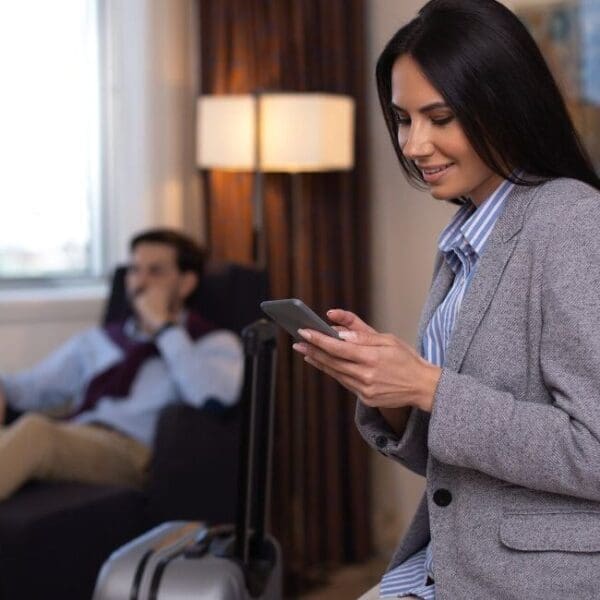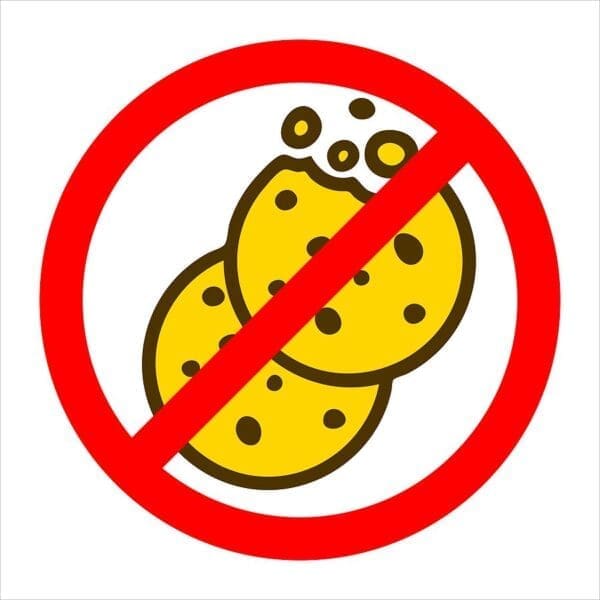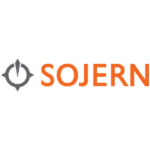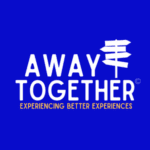 Hotel marketing teams have enormous amounts of operational work to get through on a daily basis, which makes it difficult to keep pace with the increasing levels of market competition and emerging new technologies.
Hotel marketing teams have enormous amounts of operational work to get through on a daily basis, which makes it difficult to keep pace with the increasing levels of market competition and emerging new technologies.
Through our experience working with hotels (particularly independents), the challenges are ever-present upon initial discussions with clients. Many of the following points (which we will shortly explore further) are an ongoing concern, and challenges which our clients often present for agencies such as our own to support with tackling.
1. Tracking and interpreting data
One thing that is abundantly clear from our experience working with hotels is that marketing and revenue teams can ill-afford to work in silos. There needs to be constant dialogue and flows of communication back and forth between both departments around key factors, such as:
- Gaps in availability
- Demand for/lack of for non-room night bookings
- Seasonal revenue patterns and trends
- Rate updates and offers
Revenue teams will typically understand from their Property Management Systems (PMS) and Internet Booking Engines (IBEs) which products (such as rooms) or other areas of the hotel revenue has been driven. Marketing teams will look to attribute all revenue back to source, to understand which channels are driving the profits or which perhaps aren’t working. Moreover, marketing teams need to know where they need to fill gaps in bookings well in advance, to perhaps look towards boosting bookings through offers or discounted stays.
Hotel marketing teams can sometimes find themselves overburdened by everyday tasks to market multiple areas of a hotel – whether it be for weddings, conferences, or other events – so much so that there is (understandably) rarely enough time to digest the data or to understand performance in enough depth to make informed decisions quickly enough.
2. Outranking OTAs whilst still needing OTAs
Many hotels can be overly dependent on filling rooms for their properties through online travel agents (OTAs), paying out large amounts of commission to the likes of Booking.com for room night bookings for the assurance of their hotel reaching a wide ranging audience.
In reality, outbidding Booking.com, even for your own brand can be difficult, especially if looking to maintain constant visibility and impression share. OTAs will bid on your hotel name, and look to position themselves above your hotel’s organic listing.
We still discover a number of hotels not protecting their own brand through Google and failing to drive traffic and business through their own websites. In fact, a number of hotels are so dependent on sales from OTAs that they allow their own websites to become outdated and not suitable or trustworthy enough to generate direct bookings. Without the knowledge of how to tackle the conundrum of balancing room bookings through OTAs and direct bookings, it can be difficult to achieve direct bookings and full rate revenue.
Hotel marketing teams should be looking towards protecting the interests of their hotel, generating full rooms rate revenues, using approaches through Google Ads (PPC) and Meta search to maximise visibility, even if requiring agency support to achieve this goal.
3. Disruptors to hotels
There is no doubt that the likes of AirBnB are disrupting the hospitality industry and this impact has been felt by a number of hotels. Hotels can rarely afford to lower their rates to the level of many AirBnB rates, so rather than even attempting to compete, it may be smarter to focus on learning from the strengths of AirBnBs that can be incorporated into your hotel and promoting the core strengths and USPs (over AirBnBs )of your hotel.
Many AirBnBs use the power of reviews and discounts to nearby attractions to reel in guests. The reviews are highly visible through the AirBnB dashboard for each property, whereby hotels reviews tend to be hosted on third party sites such as TripAdvisor. Perhaps hotels should look more towards displaying their TripAdvisor overall rating score (through a widget) onto their respective sites.
In terms of your hotels strengths, put the emphasis around promoting the key features that AirBnBs are unlikely to have, such as a reception desk, concierge, loyalty reward programs, free room upgrade, pool, spa and treatment rooms as well as stringent health and safety regulations.
4. Driving non-room based bookings
Is enough done to drive footfall, especially weekdays Mon-Fri for F&B? Is your hotel targeting the correct audiences through social on the F&B front for i.e. afternoon tea? How about conference/business bookings? Are you targeting new audiences, using B2B platforms such as Linkedin to do so; even remarketing to businesses who landed on your conferences/events page but didn’t convert?
5. Adapting to new technologies
Hotels can sometimes be slow to adopt advances in technology. A number of independent hotels still don’t have responsive websites to render on mobile and tablet devices; yet some hotels in Japan are using face recognition to check guests in.
Website technology is evolving, and chatbots are something hotels can look to incorporate through their respective websites. A number of established hotels such as the Marina Bay Sands in Singapore have already incorporated a Facebook Chat Bot, powered by AiChat.
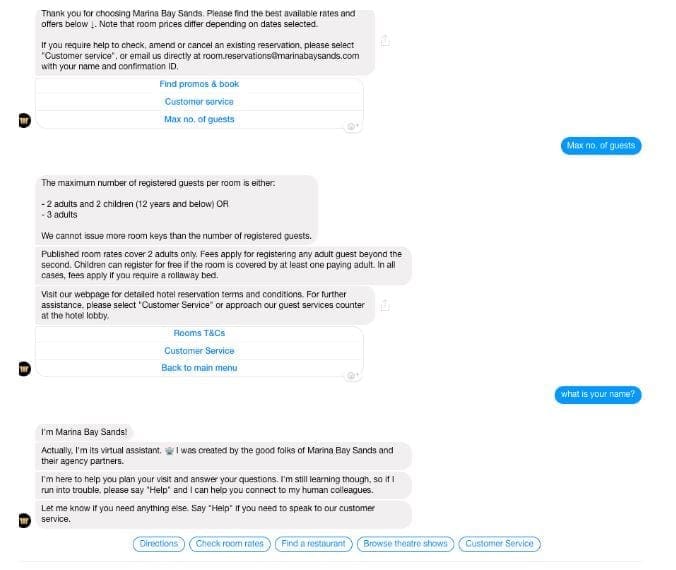 Hotels only get out as much as they feed into such artificial intelligence (AI). The effectiveness of any chat bot can only be measured by the information fed into the bot. This machine learning should aim to anticipate every single possible guest request.
Hotels only get out as much as they feed into such artificial intelligence (AI). The effectiveness of any chat bot can only be measured by the information fed into the bot. This machine learning should aim to anticipate every single possible guest request.
Below is an example of a chat bot incorporated onto one of our client’s websites, Greenwoods Hotel and Spa in Essex; acting almost as a virtual concierge.
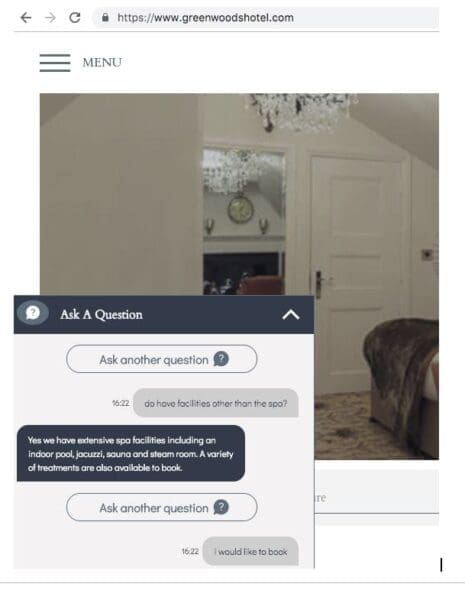 Aside from AI, there are other technologies hotels could be looking at, such as WhatsApp, to communicate both with those querying a stay as well as current guests.
Aside from AI, there are other technologies hotels could be looking at, such as WhatsApp, to communicate both with those querying a stay as well as current guests.
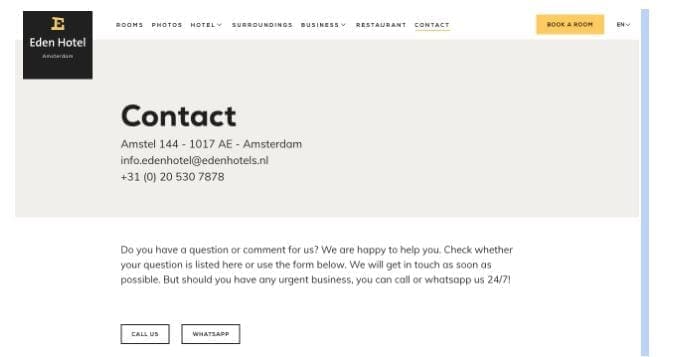 Example above taken from the Eden Hotel in Amsterdam
Example above taken from the Eden Hotel in Amsterdam
6. Incentivising guests to book direct
Ultimately if your hotel is looking to drive direct bookings, the website needs to be as sticky as possible; just as the OTAs are. If you view a property on Booking.com, you may perhaps see the same property appear again through remarketing. The OTA may also send you an email if you already have an account registered with them, reminding you to book.
A similar principal can be followed by your hotel, incorporating smart remarketing, exit capture forms and callouts across your hotel’s website to encourage lookers to become guests by booking direct. Is your site working hard enough to encourage guests to book direct, and what benefits to guests are there of doing so over an OTA?
There are a number of conversion tools for Hotels in the marketplace to support hotels with optimising their conversion rates.
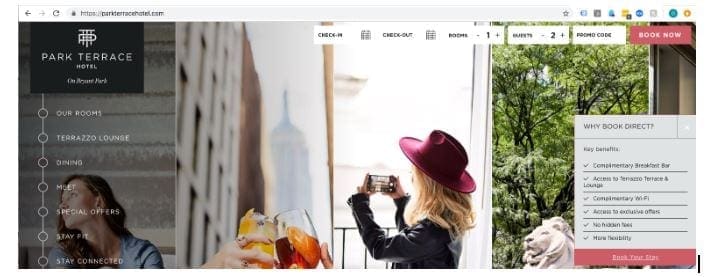 Above is an example of a call to action (CTA) on New York’s Park Terrace Hotel, courtesy of Sweetnr
Above is an example of a call to action (CTA) on New York’s Park Terrace Hotel, courtesy of Sweetnr
Summary
There is plenty of scope ahead for hotels to really push their ‘book direct’ propositions to increase direct revenue without paying out so much commission to OTAs. Although OTAs play a role in securing bookings, by following many of the six steps above, we hope your hotel is less reliant upon them moving forward. Good luck in your endeavours to #ownyourguest and secure increased direct bookings!







